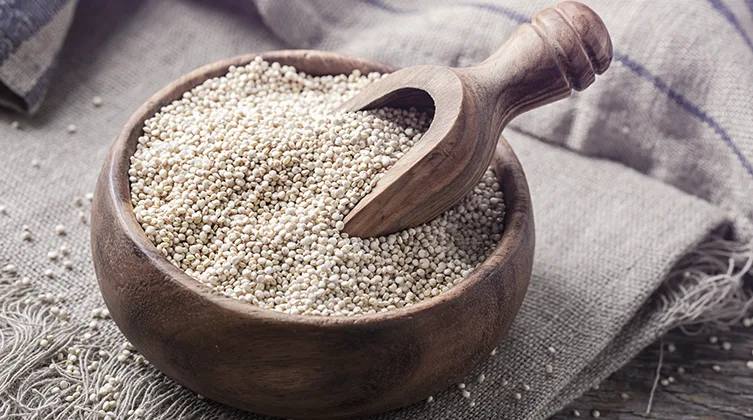The thought of consuming protein often evokes images of chowing down on a piece of steak, chicken or buckets loaded with chalky amino acids. This is certainly true for my partner-in-crime and it’s required a subtle retraining of his protein perceptions.
Many people today are consuming protein in excess of their actual requirements. Unlike carbohydrates and fat, protein storage is extremely limited within the body. Therefore, protein that is not required will be excreted or lost in the sweat. With the price of some protein powders today, this can make for some very expensive urine!
The average Australian woman requires about 46 grams of protein per day, and men about 64 grams. The amount can be greater in elite athletes, very serious recreational exercises, body builders, the elderly, and pregnant or lactating women. Although their concomitant increased energy consumption will often service this increased protein requirement.
There are many fantastic plant-based sources of protein and I’m certainly an advocate of meat-free days. Below is a summary of some of the best plant-based sources of protein:
QUINOA
Protein: 8 grams per cup, cooked
Go-to recipe: Quinoa summer salad
Quinoa is a complete protein source, meaning it provides all 10 essential amino acids (some research papers suggest 9 are essential). Amino acids are the building blocks of proteins and the essential ones cannot be produced by the body, but must be consumed in the diet. In addition to being a plant-based protein powerhouse, quinoa is a great source of magnesium, iron, manganese and fibre. It is extremely versatile and can be used in both sweet and savoury dishes from breakfast through to the dinner table. Contrary to intuition, quinoa is actually a seed and not a grain.
CHICKPEAS
Protein: 15 grams per cup, cooked
Chickpeas are a wonderful plant-based source of protein, as well as dietary fibre. They provide sustained energy and are easily incorporated into the diet. Think hummus, falafels, salads, curries, soups, stews or check out my Quinoa summer salad recipe. If you suffer irritable bowel syndrome (IBS), they may not serve you until your gastrointestinal troubles are resolved.
LENTILS
Protein: 18 grams per cup, cooked
Nutty and earthy in flavour, lentils are easy to prepare and compliment a variety of meals. They are low in calories and high in nutritional value. Lentils also provide sustained energy, fuelling you for longer and helping to avoid that insulin spike. Increasingly, they are becoming recognised as a great pre-exercise food source for endurance activities, such as marathons or long cycling events.
BLACK BEANS
Protein: 15 grams per cup, cooked
Black beans are perhaps most familiar due to their regular appearance in Latin American cuisine. They are also a tremendous plant-based source of protein. And don’t let the dark colour throw you off – it’s due to their impressive array of antioxidants and anti-inflammatory phytonutrients. Black beans are also great for gut health as a source of resistant starch, which helps support the growth of desirable bacteria in the gut. Remember to soak and rinse them well before cooking.
TOFU / TEMPEH
Protein: 14g to 22g per cup, cooked
Tofu and tempeh offer a complete source of protein. Tofu is made from the curds of soybeans and has a soft, spongy consistency, while tempeh is made from fermented soybeans and is more firm and chewy. Both tofu and tempeh absorb the flavours of the food they’re cooked with, making them a versatile plant-based source of protein.
NUTS AND NUT BUTTER
Protein: 4 to 10 grams per serving (1-2 tbs)
Nuts pack a nutritional punch, providing protein and other wonderful nutrients, such as vitamins E and A, omega fatty acids, fibre, phosphorus, potassium and magnesium. Raw nuts are best! And skip the nut butters with added hydrogenated oils. The protein content of nuts and nut butters ranges from 18 to 25 grams per 100 grams. Almonds, cashews, pistachios and peanut butter rank fairly high.
CHIA SEEDS
Protein: 3 grams per tablespoon
Chia seeds contain approximately 20 percent protein and join quinoa and tofu as another plant-based source of complete protein. Chia seeds are incredibly versatile, convenient and can be used in place of eggs for cooking. Add them to breakfast cereals, granola bars, cakes, homemade jams and smoothies. In addition to being a great protein source, chia seeds provide an array of nutrients including potassium and omega-3 fatty acids, which are great for your skin and hair, and vascular system.
OATS
Protein: 14 grams per cup, dry
Oats are a great staple food and offer relatively high protein content for a grain. Oats are also rich in soluble fibre, which is great for gut health and liver support, and silica. Silica is known by some as a great beauty mineral. It supports healthy connective tissue, which forms a framework beneath the skin’s surface and also constitutes the blood, bone and cartilage.
HEMP SEEDS
Protein: 11g per ¼ cup
Hemp seed’s nutrition credentials are excellent. They are a great plant-based protein source and have a high omega-3 fatty acid profile. You may be thinking of happy hippies, deducting that the hemp seed is related to marijuana? Indeed they are! Marijuana and hemp seeds both come from the Cannabis sativa plant, but from different varieties, like different breeds of dogs. Hemp itself contains no, or very low levels of THC (delta 9-tetrahydrocannabinol), the chemical responses for the psychoactive effects of marijuana. Nevertheless, hemp seed’s remain officially banned for food purposes in Australia, while they are available in other countries including the US, Canada and Europe.
GREEN VEGETABLES
Perhaps a surprise inclusion, but some vegetables can offer a significant amount of protein when consumed in large enough quantities. You need only to consider the muscle mass of gorillas for evidence of this! Vegetables also provide lots of vitamins, minerals and antioxidants required for cellular maintenance, growth and repair. One cup of green peas contains around 8 grams of protein and one cup of chopped broccoli about 3 grams.
We are easily led to believe that meat and other animal-based products are essential for our protein needs and plant-based diets are often under fire for being insufficient in protein. However, as you can see there are plenty of wonderful plant-based sources of protein that are also packed full of nutrition. Replacing some of your meat intake with plant-based foods may confer several health benefits, such as lowering your risk of colon cancer, heart disease and improving your overall lustre.





